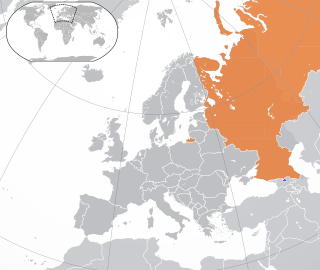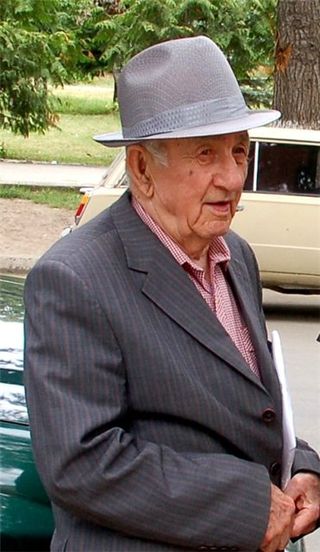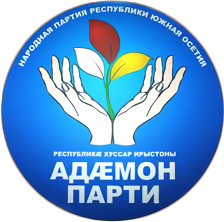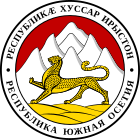
The Georgian–Ossetian conflict is an ethno-political conflict over Georgia's former autonomous region of South Ossetia, which evolved in 1989 and developed into a war. Despite a declared ceasefire and numerous peace efforts, the conflict remained unresolved. In August 2008, military tensions and clashes between Georgia and South Ossetian separatists erupted into the Russo-Georgian War. Since then, South Ossetia has been under a de-facto Russian control.

South Ossetia, a mostly unrecognized republic in the South Caucasus, formerly the South Ossetian Autonomous Oblast within the Georgian Soviet Socialist Republic with its capital in Tskhinvali, held a referendum on independence on November 12, 2006.

The Communist Party of South Ossetia is a communist party in South Ossetia. The party was founded in 1993. As of 2004, the party claimed a membership of 1,500. The party seeks recognition of the Republic of South Ossetia, which is internationally recognized by most countries as a part of Georgia.

Russia–South Ossetia relations refers to the bilateral relationship between Russia and the Republic of South Ossetia, a disputed region in the South Caucasus, located on the territory of the South Ossetian Autonomous Oblast within the former Georgian Soviet Socialist Republic.
The Unity Party was a major political party with a socially conservative ideology in South Ossetia during the 2000s. South Ossetia is a partially recognized Caucasian republic, considered by most countries to be a part of Georgia. The Unity Party, founded in 2003, supported former President Eduard Kokoity, and was for a decade the largest political party in South Ossetia. After the 2009 elections, the party held 17 out of 34 seats in South Ossetia's parliament. It is modeled after and is closely linked to the United Russia party, with which it has signed an inter-party cooperation agreement. The party is a winner of the 2004 and 2009 parliamentary elections.

The Parliament of South Ossetia is the unicameral legislature of the partially recognized Republic of South Ossetia. The 34 members of parliament are elected using a mixed system of Party-list proportional representation (17) and single-member districts (17). South Ossetia has a multi-party system, and currently 5 political parties are represented in parliament and has 6 independent MPs elected through single-member districts. The parliament is headed by a speaker, who is elected from among the members. Since 15 September 2022 the speaker of parliament is Alan Alborov, one of the four deputees of the Nykhaz party of president Alan Gagloev, after Alan Tadtaev of United Ossetia was forced to resign.

Parliamentary elections were held in South Ossetia on 23 May 2004.

Znaur Nikolayevich Gassiyev was a South Ossetian politician, who was one of the leaders of the South Ossetian independence movement in the early 1990s, which culminated in the 1991–1992 South Ossetia War.

Stanislav Jakovlevich Kochiev is a South Ossetian politician, who is a former presidential candidate and former chairman (speaker) of the Parliament of South Ossetia.

The People's Party of South Ossetia is a social liberal political party in South Ossetia, a partially recognized Caucasian republic, considered by most countries to be a part of Georgia. The party is known for being staunch supporters of former president Eduard Kokoity.

Presidential elections were held in South Ossetia on 13 November 2011. A referendum was held on the same day. A run-off was held on 27 November, but the result were invalidated by the Supreme Court of South Ossetia. A new election was scheduled for 25 March 2012.

Presidential elections were held in South Ossetia in 2001. As no candidate received a majority of the vote in the first round on 18 November, a second round was held on 6 December, which was won by Eduard Kokoity, who defeated Stanislav Kochiev. Incumbent president Lyudvig Chibirov was eliminated in the first round mostly due to popular disdain in his economic policies. The elections were boycotted by the Georgian population.

Presidential elections were held in the disputed territory of South Ossetia on 10 April 2022. As none of the presidential nominees obtained at least 50% of the votes, a runoff was held on 8 May 2022, between the top two candidates, Alan Gagloev and incumbent president Anatoly Bibilov.

David Georgievich Sanakoev is an Ossetian separatist, indicted war criminal, politician, diplomat, and international fugitive, who served as Minister of Foreign Affairs of South Ossetia from 2012 to 2015, during the presidency of Leonid Tibilov.

The Unity of the People is a nationalist political party in South Ossetia, a partially recognized Caucasian republic, considered by most countries to be a part of Georgia. The party is led by Vladimir Kelekhsaev.
The Fatherland Socialist Party, also known as the Socialist Party "Fatherland" or Fatherland, is a minor opposition political party in South Ossetia and the Russian republic of North Ossetia–Alania. The party is led by Vyacheslav Gobozov, former head of the committee for information during the administration of Anatoly Bibilov. They position themselves as socialist and have been considered a marginal radical party for their entire existence.
Vyacheslav Gobozov is a South Ossetian politician who has been the Chairman of the Fatherland Socialist Party since its inception for the 2009 South Ossetian parliamentary election. He is one of the leading figures in the South Ossetian anti-Russian opposition. However, he is also a staunch Ossetian nationalist and supports the Republic's independence and maintains a pragmatic approach to when and where to oppose and accept Russian support.
Iron is the name of two political parties that existed in different points in time in the disputed state of South Ossetia, which the international community recognizes as part of Georgia. The first, from 2010, was founded by South Ossetian dissidents.

Parliamentary elections were held in South Ossetia on 9 June 2024 to determine the composition of the South Ossetian Parliament, the legislature of the partially recognized Caucasian Republic of South Ossetia, which most of the United Nations recognizes as part of Georgia. In the 2022 presidential elections South Ossetia's opposition came to power for the first time since 2012, however, the government has been plagued by scandals.
Amiran Dyakonov is an Ossetian politician from the partially recognized Caucasian Republic of South Ossetia, which most of the UN recognizes as part of Georgia, occupied by Russia. Dyakonov is a veteran legislator for the People's Party, previously being a member of the Unity Party.














